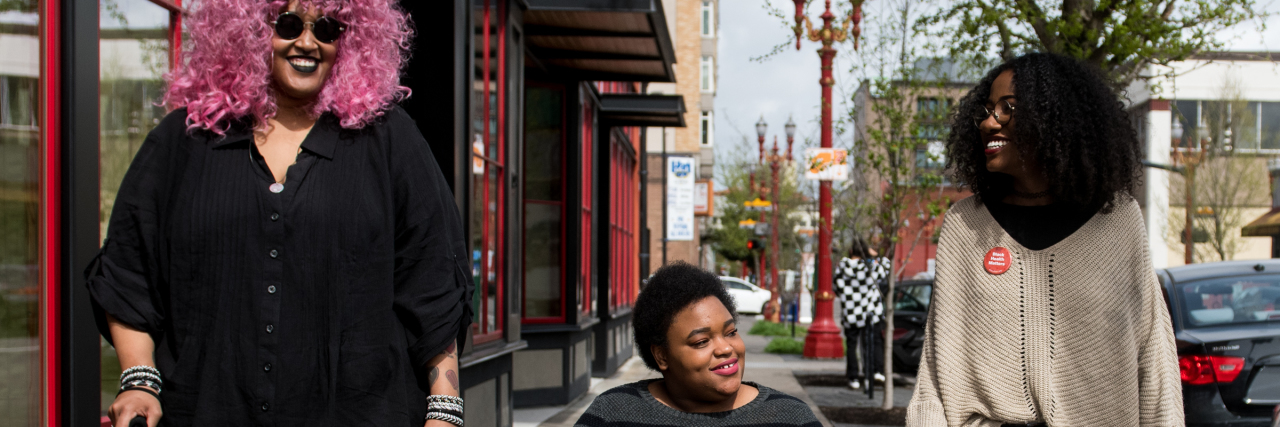I am a disability advocate, a disability blogger and I am disabled. I’ve written about disability before, how it has affected me personally and how I struggle with the word as a defining term for who I am. We all want to be seen as an individual beyond a label that may change how people perceive us, and yet, disability is a part of who I am, like my brown hair. But it’s not something that should be seen first, or something an abled person should make a judgment about and consequently make a judgment about who I am based on it.
Disability shouldn’t be a bad word. What do I mean? When has disability become a bad word, you ask? When you have those in the abled community trying to supersede how disabled people are perceived, under the guise that “disability” is a negative word, and it would be better for the community to be seen as “differently abled.”
Recently, a trending hashtag on Twitter, #AbledsAreWeird has enabled many in the disability community to share their own experiences with discrimination. But not every experience shared is blatantly discriminatory, such as being denied employment because of a disability. In some instances, it is more along the lines of a polite disregard, in which we are seen as something “other” and disconnected from “normal” society.
I’m not writing this to “educate” the abled community or to scold them. I have always felt that without positive discourse, without a sharing of ideas, experiences and feelings, a society can never improve. When people in the disabled community share these experiences, it can help to open a dialog so improvements can be made. Just as importantly, it’s a means for disabled people to commiserate over feelings of discrimination and otherness.
You might be #AbledAndWeird if:
• You think it is offensive to call someone disabled and prefer to call them “specially abled” or “differently abled.”
Many of us identify as disabled. Arguing with someone about how they identify and trying to force them to identify as something you find more politically correct is arrogant and demeaning. It almost implies we are children and need a “grown-up” to properly school us in the right word we should use to define who we are. We don’t.
• When you attempt to inspire us by comparing us to another person with a disability, pointing and saying “Look! If they can do it, you can too!”
Not every disability is the same, even if on the outside both people may use a wheelchair. One person may not be capable of the same things as another, and that is OK. Don’t shame someone under the guise of trying to motivate them because you believe their disability isn’t as severe as somebody else’s.
• You’re a doctor and tell a patient they don’t want to get better because they won’t take a drug.
While we may respect your training and education, our bodies are still our own and we have the right to make choices about what we put into them. Some drugs have debilitating side effects, and we should be able to choose without being made to feel as though we’re a criminal.
• You’re shopping at the market and need to reach something on the top shelf, but someone in a wheelchair is blocking your access and you just push them out of the way.
I wish I were joking, but I am not. That actually happens. Who gave you the right to touch someone without permission? You might think it’s just a wheelchair, but it’s not. A wheelchair is an extension of a person’s body when they are utilizing it to get around. If you wouldn’t dream of pushing an able-bodied person out of the way to get what you wanted, why would you do that to someone in a wheelchair?
• When you bring up accessibility for all but when it comes time to follow through, you make excuses.
The expense of it is too high, or the construction is too complex, or it would take too long, or you think the number of people who would use it doesn’t make it a practical expense. If you don’t make public buildings, bathrooms and streets accessible for all, you are excluding people.
• You think it’s OK to ignore those who are deaf within a mixed room.
I don’t think many people understand how difficult it is to be disabled. I think many people feel that if it doesn’t personally touch them in some way, they don’t need to be empathetic to the situation. They tend to feel it is the responsibility of the disabled person to make sure their needs are met. The deaf/blind community is an excellent example of this, where a small percentage of the population has been forced to navigate a world not built for them. But it goes beyond the physical world. It’s going to functions and events where an ASL interpreter is not provided. It’s going to a restaurant where you are in the company of both those who can hear and those who can’t, and the server ignores you because they feel you have others who can speak for you, or they don’t think they can communicate with you and they don’t even try.
Disability is not a bad word. Being disabled isn’t something you need to whisper about or call by a different name, especially one ableds invented because they think “disability” is offensive. Accessibility for all shouldn’t feel like the newest candidate’s edgy slogan that becomes the newest trending hashtag because it sounds nice. It should be a reality, something we actively strive for which motivates us to reach out to disabled communities to find out what they need and what’s important to them.
This story originally appeared on Love Karma Food.
Photo via Disabled and Here.

